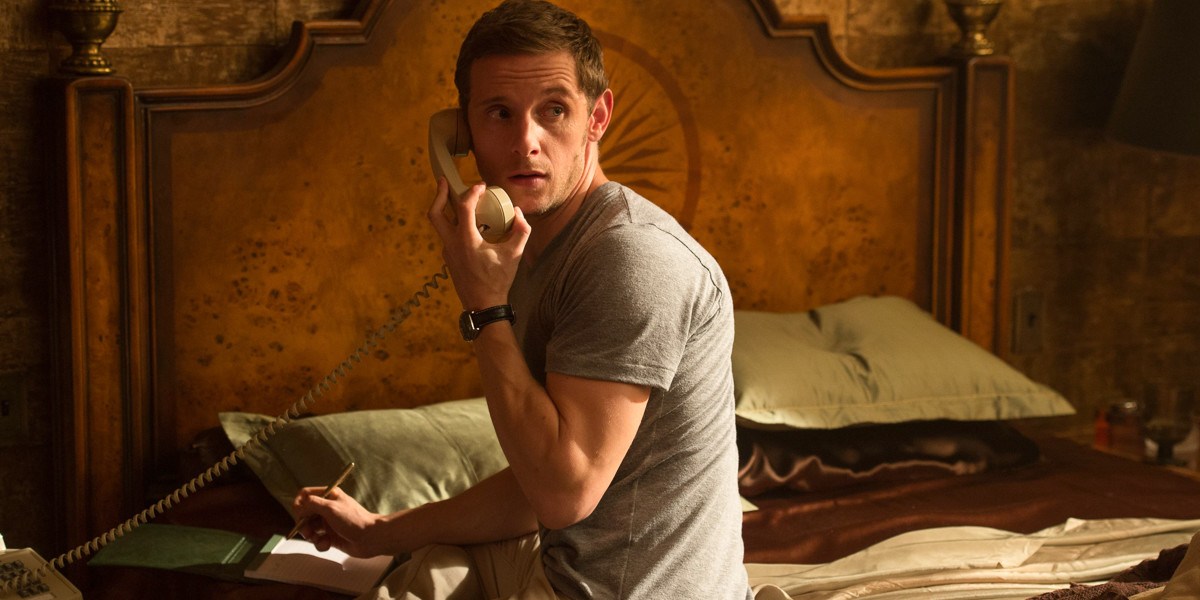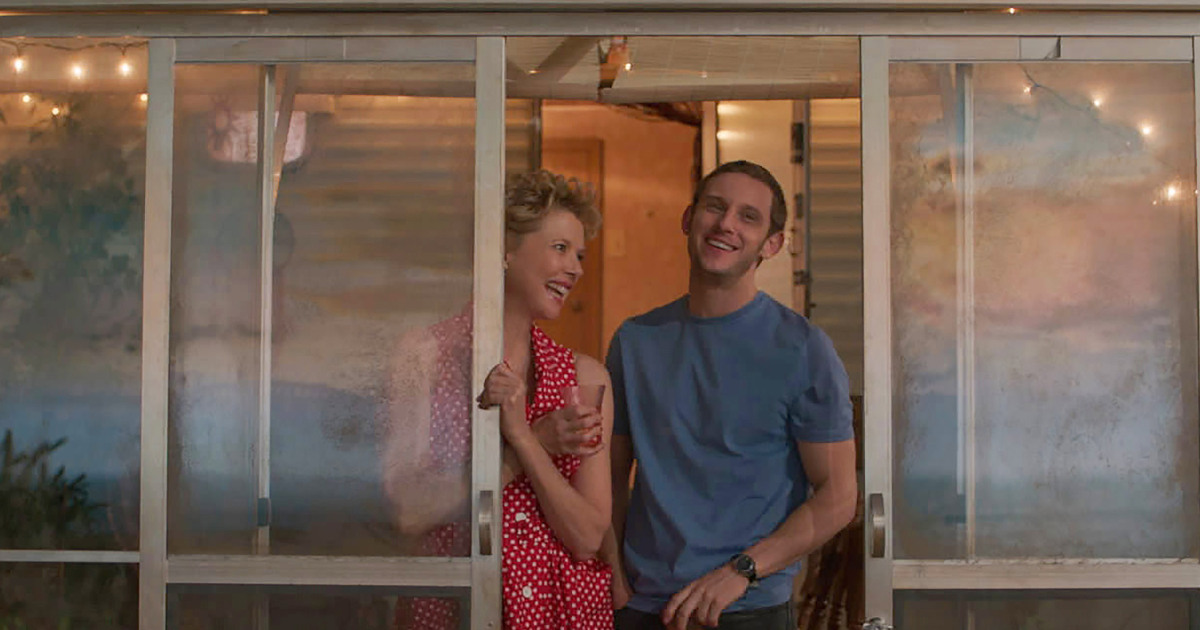Film Stars Don't Die in Liverpool review - Annette Bening mesmerises
The story of faded femme fatale Gloria Grahame is coy about her past
Screen biographies are tricky things to pull off when the person portrayed has left behind an indelible screen presence. It was hard to love Michelle Williams dragging up for My Week with Marilyn; Grace of Monaco was Nicole Kidman refracted through the eyes of Madame Tussaud. But Annette Bening is wholly mesmerising in her reincarnation of Gloria Grahame, the Oscar-winning femme fatale who became a jobbing actress in late 1970s England.
Film Stars Don't Die in Liverpool is based on actor Peter Turner’s slim, self-deprecating memoir of his love affair with Grahame, first published in 1986 some five years after her death. Turner met the film noir legend when they both rented rooms in a London boarding house in 1979. Despite being at least a generation older than him, they fell in love and their romance lasted two years, stretching from New York to LA before ending in Liverpool in his parents’ house. Jamie Bell (pictured above) is charming as the young Turner, a compliant beau with a kind heart, wide shoulders and neat footwork. They meet cute when he channels Tony Manero to help Grahame practise the hustle. It’s fun to see that Billy Elliot still has the moves but it is Bening’s shimmy that breaks your heart. This is her movie and it's aimed at the Academy. She captures Grahame’s breathy voice and sharp wit perfectly; her pleasure in her young lover is clear, as is her wistfulness for the classical stage career she never had. Bening doesn't dodge the lens which highlights her own ageing face and gives a superbly brave performance. I found myself scurrying back to The Grifters, the neo-noir she made in her twenties, where she plays exactly the kind of playful moll that Grahame trademarked in the 1950s.
Jamie Bell (pictured above) is charming as the young Turner, a compliant beau with a kind heart, wide shoulders and neat footwork. They meet cute when he channels Tony Manero to help Grahame practise the hustle. It’s fun to see that Billy Elliot still has the moves but it is Bening’s shimmy that breaks your heart. This is her movie and it's aimed at the Academy. She captures Grahame’s breathy voice and sharp wit perfectly; her pleasure in her young lover is clear, as is her wistfulness for the classical stage career she never had. Bening doesn't dodge the lens which highlights her own ageing face and gives a superbly brave performance. I found myself scurrying back to The Grifters, the neo-noir she made in her twenties, where she plays exactly the kind of playful moll that Grahame trademarked in the 1950s.
Director Paul McGuigan, collaborating with the gifted cinematographer Ula Pontikos, pulls off some real cinema magic. They use what looks like Fifites style back projection and fluid camera moves to convey the lovers' golden time in America (pictured below), although the whole film was actually shot in the UK. But it falls down somewhat in the art department. The interior scenes are suffocating with their near-obsessive period detail – patterned wallpaper, nightmarish carpeting and painfully bad wigs for Julie Walters as Peter’s warm-hearted mum and Stephen Graham as his grumpy brother. Too many scenes in the kitchen in Liverpool threaten to sink the film into kitchen sink realism; Walters overdoes the loveable tolerant mum act. While I was grateful that there weren’t too many chunks of clunky exposition shoe-horning Grahame’s scandalous marital history into the dialogue, the script is oddly vague about Grahame's romantic history and its repercussions. She had four husbands, including the great director Nicholas Ray with whom she had a son; their marriage ended when she was found in bed with Ray's 13-year old son, Tony. She went on to marry Tony Ray some years later and have two more children with him. The ensuing scandal made it more than a little hard for her to work in Hollywood and she came to England to work in theatre and TV.
Too many scenes in the kitchen in Liverpool threaten to sink the film into kitchen sink realism; Walters overdoes the loveable tolerant mum act. While I was grateful that there weren’t too many chunks of clunky exposition shoe-horning Grahame’s scandalous marital history into the dialogue, the script is oddly vague about Grahame's romantic history and its repercussions. She had four husbands, including the great director Nicholas Ray with whom she had a son; their marriage ended when she was found in bed with Ray's 13-year old son, Tony. She went on to marry Tony Ray some years later and have two more children with him. The ensuing scandal made it more than a little hard for her to work in Hollywood and she came to England to work in theatre and TV.
In one bravura scene, Vanessa Redgrave (playing Grahame's mother) and Frances Barber (her spikey sister) meet Peter in Grahame's beachside trailer home. They interrogate him over an awkward dinner in the bijou love nest. Disapproval of their relationship hums in the air. Grahame refers to being a mother herself, and there's a brief glimpse of a son at the very end, but it does feel as if a significant aspect of her life has been unexplored, perhaps due to the sensitivities of her surviving children.
Films Stars Don’t Die in Liverpool is ambitious in its structure (time frames shift in a fluid camera move) so the lack of a subtler script is a disappointment. But if it makes a new generation go in search of Gloria Grahame’s back catalogue (In a Lonely Place is a great place to start) and wins Bening a well-deserved Oscar, it'll be worth it.
Overleaf: watch the trailer for Film Stars Don't Die in Liverpool
LFF 2017: Film Stars Don't Die in Liverpool / Professor Marston and the Wonder Women reviews - stellar turns by Annette Bening and Rebecca Hall
Two fascinating true stories of iconic women told with not quite enough flair
Screen biographies are tricky things to pull off when the person portrayed has left behind an indelible screen presence. It was hard to love Michelle Williams dragging up for My Week with Marilyn; Grace of Monaco was far from Nicole Kidman’s finest hour.
Sgt Pepper's Musical Revolution, BBC Two review - how the Fab Four changed pop music forever
Howard Goodall's forensic examination of the making of a masterpiece
It probably hasn’t escaped your notice that we are celebrating the 50th anniversary of Sgt Pepper’s Lonely Hearts Club Band, the triumphant vindication of the Beatles' decision to quit touring and instead exploit the possibilities of the recording studio. Could there be anything new to say about an album so thoroughly analysed, anatomised, eulogised and mythologised?
DVD/Blu-ray: Letter to Brezhnev
Eighties low-budget classic set in Liverpool given a welcome re-release
Little Boy Blue review – 'the sum of all fears'
Skilful ITV dramatisation of real-life murder story
Turning the real-life murder of an 11-year-old boy into a four-part TV drama carries obvious risks (might it be exploitative, sick or in bad taste, for instance?), but judging by this opening episode of Little Boy Blue (ITV), screenwriter Jeff Pope has skilfully walked the line.
Beethoven Ninth, RLPO, Petrenko, Philharmonic Hall, Liverpool
Standing ovation ends series of all nine Beethoven symphonies
The new season at the Royal Liverpool Philharmonic is focusing on revolutionaries. Bach, Beethoven and Berlioz all feature strongly over the next few months, as will Stravinsky and – where else but Liverpool? – The Beatles.
The Beatles: Eight Days a Week - The Touring Years
Is there anything new to say about the Beatles? Amazingly, yes. Plus there's ravishingly restored footage from Shea Stadium
It could be a book, film, TV or radio piece, essay or exhibition. If it’s about or based on The Beatles, the question is always the same: how on earth can anything new be said? In the case of Ron Howard’s Eight Days a Week: The Touring Years, surprisingly quite a lot, is the answer.
Vassa Zheleznova, Southwark Playhouse
Rarely performed Gorky play re-emerges as a relentless dirge
In the town of Nizhny Novgorod where Maxim Gorky was born, it was said that “the houses are made of stone, the people of iron”. Vassa Zheleznova, the titular matriarch of this rarely performed play, is one such person. She is a businesswoman of steely will and juggernaut energy whose tragedy is to see her family destroyed by the same bourgeois values that she has fought so fiercely to preserve.
The Violators
Ballsy, bruising, brilliant directorial debut feature from novelist Helen Walsh
British filmmaking does gritty suburban dramas better than anywhere. Stories stripped of superficial action, from Ken Loach’s early work through to more recent stand-out films like Tyrannosaur. The Violators offers a new voice producing a superb feature set in a bleak Merseyside suburb. Debut director Helen Walsh is better known as a novelist, creating tales thick with human drama, sometimes in grim settings, and The Violators adheres to this template.
